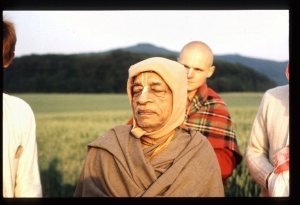SB 9.18.32: Difference between revisions
m (1 revision(s)) |
No edit summary |
||
| Line 1: | Line 1: | ||
{{info | {{info | ||
|speaker= | |speaker=Śukadeva Gosvāmī | ||
|listener=King | |listener=King Parīkṣit | ||
}} | }} | ||
[[Category:Srimad-Bhagavatam - Canto 09 Chapter 18]] | |||
[[Category:Bhagavatam Verses Spoken by Sukadeva Gosvami - Vanisource|091832]] | |||
<div style="float:left">'''[[Srimad-Bhagavatam]] - [[SB 9|Ninth Canto]] - [[SB 9.18: King Yayati Regains His Youth|Chapter 18: King Yayāti Regains His Youth]]'''</div> | |||
<div style="float:right">[[File:Go-previous.png|link=SB 9.18.31]] '''[[SB 9.18.31]] - [[SB 9.18.33]]''' [[File:Go-next.png|link=SB 9.18.33]]</div> | |||
{{RandomImage}} | |||
==== TEXT 32 ==== | ==== TEXT 32 ==== | ||
<div | <div class="verse"> | ||
rāja-putryārthito 'patye | :rāja-putryārthito 'patye | ||
dharmaṁ cāvekṣya dharmavit | :dharmaṁ cāvekṣya dharmavit | ||
smarañ chukra-vacaḥ kāle | :smarañ chukra-vacaḥ kāle | ||
diṣṭam evābhyapadyata | :diṣṭam evābhyapadyata | ||
</div> | </div> | ||
| Line 17: | Line 22: | ||
==== SYNONYMS ==== | ==== SYNONYMS ==== | ||
<div | <div class="synonyms"> | ||
rāja- | ''rāja-putryā''—by Śarmiṣṭhā, who was the daughter of a king; ''arthitaḥ''—being requested; ''apatye''—for a son; ''dharmam''—religious principles; ''ca''—as well as; ''avekṣya''—considering; ''dharma-vit''—aware of all religious principles; ''smaran''—remembering; ''śukra-vacaḥ''—the warning of Śukrācārya; ''kāle''—at the time; ''diṣṭam''—circumstantially; ''eva''—indeed; ''abhyapadyata''—accepted (to fulfill the desire of Śarmiṣṭhā). | ||
</div> | </div> | ||
| Line 24: | Line 29: | ||
==== TRANSLATION ==== | ==== TRANSLATION ==== | ||
<div | <div class="translation"> | ||
When Princess Śarmiṣṭhā begged King Yayāti for a son, the King was certainly aware of the principles of religion, and therefore he agreed to fulfill her desire. Although he remembered the warning of Śukrācārya, he thought of this union as the desire of the Supreme, and thus he had sex with Śarmiṣṭhā. | When Princess Śarmiṣṭhā begged King Yayāti for a son, the King was certainly aware of the principles of religion, and therefore he agreed to fulfill her desire. Although he remembered the warning of Śukrācārya, he thought of this union as the desire of the Supreme, and thus he had sex with Śarmiṣṭhā. | ||
</div> | </div> | ||
| Line 31: | Line 36: | ||
==== PURPORT ==== | ==== PURPORT ==== | ||
<div | <div class="purport"> | ||
King Yayāti was completely aware of the duty of a kṣatriya. When a kṣatriya is approached by a woman, he cannot deny her. This is a religious principle. Consequently, when Dharmarāja, Yudhiṣṭhira, saw Arjuna unhappy after Arjuna returned from Dvārakā, he asked whether Arjuna had refused a woman who had begged for a son. Although Mahārāja Yayāti remembered Śukrācārya's warning, he could not refuse Śarmiṣṭhā. He thought it wise to give her a son, and thus he had sexual intercourse with her after her menstrual period. This kind of lust is not against religious principles. As stated in Bhagavad-gītā ([[BG 7.11]]), dharmāviruddho bhūteṣu kāmo 'smi: sex life not contrary to the principles of religion is sanctioned by Kṛṣṇa. Because Śarmiṣṭhā, the daughter of a king, had begged Yayāti for a son, their combination was not lust but an act of religion. | King Yayāti was completely aware of the duty of a ''kṣatriya''. When a ''kṣatriya'' is approached by a woman, he cannot deny her. This is a religious principle. Consequently, when Dharmarāja, Yudhiṣṭhira, saw Arjuna unhappy after Arjuna returned from Dvārakā, he asked whether Arjuna had refused a woman who had begged for a son. Although Mahārāja Yayāti remembered Śukrācārya's warning, he could not refuse Śarmiṣṭhā. He thought it wise to give her a son, and thus he had sexual intercourse with her after her menstrual period. This kind of lust is not against religious principles. As stated in [[Bhagavad-gita As It Is (1972)|''Bhagavad-gītā'']] ([[BG 7.11 (1972)|BG 7.11]]), ''dharmāviruddho bhūteṣu kāmo 'smi:'' sex life not contrary to the principles of religion is sanctioned by Kṛṣṇa. Because Śarmiṣṭhā, the daughter of a king, had begged Yayāti for a son, their combination was not lust but an act of religion. | ||
</div> | </div> | ||
__NOTOC__ | |||
<div style="float:right; clear:both;">[[File:Go-previous.png|link=SB 9.18.31]] '''[[SB 9.18.31]] - [[SB 9.18.33]]''' [[File:Go-next.png|link=SB 9.18.33]]</div> | |||
__NOTOC__ | |||
__NOEDITSECTION__ | |||
Revision as of 03:00, 17 May 2021

A.C. Bhaktivedanta Swami Prabhupada
TEXT 32
- rāja-putryārthito 'patye
- dharmaṁ cāvekṣya dharmavit
- smarañ chukra-vacaḥ kāle
- diṣṭam evābhyapadyata
SYNONYMS
rāja-putryā—by Śarmiṣṭhā, who was the daughter of a king; arthitaḥ—being requested; apatye—for a son; dharmam—religious principles; ca—as well as; avekṣya—considering; dharma-vit—aware of all religious principles; smaran—remembering; śukra-vacaḥ—the warning of Śukrācārya; kāle—at the time; diṣṭam—circumstantially; eva—indeed; abhyapadyata—accepted (to fulfill the desire of Śarmiṣṭhā).
TRANSLATION
When Princess Śarmiṣṭhā begged King Yayāti for a son, the King was certainly aware of the principles of religion, and therefore he agreed to fulfill her desire. Although he remembered the warning of Śukrācārya, he thought of this union as the desire of the Supreme, and thus he had sex with Śarmiṣṭhā.
PURPORT
King Yayāti was completely aware of the duty of a kṣatriya. When a kṣatriya is approached by a woman, he cannot deny her. This is a religious principle. Consequently, when Dharmarāja, Yudhiṣṭhira, saw Arjuna unhappy after Arjuna returned from Dvārakā, he asked whether Arjuna had refused a woman who had begged for a son. Although Mahārāja Yayāti remembered Śukrācārya's warning, he could not refuse Śarmiṣṭhā. He thought it wise to give her a son, and thus he had sexual intercourse with her after her menstrual period. This kind of lust is not against religious principles. As stated in Bhagavad-gītā (BG 7.11), dharmāviruddho bhūteṣu kāmo 'smi: sex life not contrary to the principles of religion is sanctioned by Kṛṣṇa. Because Śarmiṣṭhā, the daughter of a king, had begged Yayāti for a son, their combination was not lust but an act of religion.